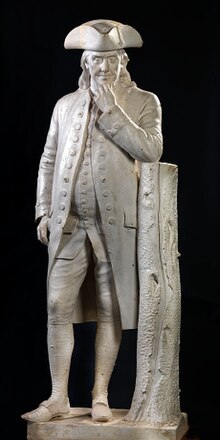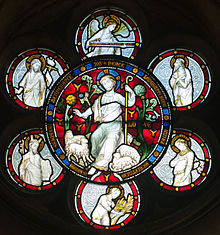Moral character

Moral character or character (derived from charaktêr) is an analysis of an individual's steady moral qualities. The concept of character can express a variety of attributes, including the presence or lack of virtues such as empathy, courage, fortitude, honesty, and loyalty, or of good behaviors or habits; these attributes are also a part of one's soft skills.
Moral character refers to a collection of qualities that differentiate one individual from another – although on a cultural level, the group of moral behaviors to which a social group adheres can be said to unite and define it culturally as distinct from others.
Psychologist Lawrence Pervin defines moral character as "a disposition to express behavior in consistent patterns of functions across a range of situations".[1] The philosopher Marie I. George refers to moral character as the "sum of one’s moral habits and dispositions".[2] Aristotle said, "we must take as a sign of states of character the pleasure or pain that ensues on acts."[3]: II.3
Overview
The word "character" is derived from the Ancient Greek word "charaktêr", referring to a mark impressed upon a coin. Later it came to mean a point by which one thing was told apart from others.
In 1982 Campbell & Bond proposed the following as major sources in influencing character and moral development:
In the military field, character is considered particularly relevant in the leadership development area. Military leaders should not only "know" theoretically the moral values but they must embody these values.[6] Military leaders are expected to lead by example. They demonstrate values and behaviors that they expect their subordinates to follow. Military leaders face ethical and morally challenging issues. Strong moral character is crucial for making these decisions, especially when the consequences of these decisions affect the lives of those under their command.[7]
History

The
Plato believed that the soul is divided into three parts of desire: Rational, Appetitive, and Spirited.[8] In order to have moral character, we must understand what contributes to our overall good and have our spirited and appetitive desires educated properly, so that they can agree with the guidance provided by the rational part of the soul. According to Plato, Moral Character is directly linked to and understanding contributions to the overall good. Associating reason and wisdom allows for individuals to discern the true nature of what is good.
Abraham Lincoln once said that character is like a tree and reputation like its shadow. "The shadow is what we think of it; the tree is the real thing."[9]
In 1919, Albert Einstein wrote in a letter to his friend, Dutch physicist Hendrik Lorentz, about his disillusionment concerning the inhumane consequences of World War I. He noted “We must remember that, on the average, men’s moral qualities do not greatly vary from country to country”.[10]
Religious views

The Islamic religion is highly concerned with moral character which is presented in many of their teachings. There are strong beliefs that society as a whole has the potential to grow in the values of virtue. Certain writing states that all Muslims have the obligation to bring truth to light as well as to prevent evil.[13] The ideology that to be a morally correct individual, there must be a belief in God is represented in many teachings.[14]
Religion and morality are interconnected;[15] however, are not synonymous. While religion depends on morality, the relationship between the two can vary across cultures, systematic beliefs, and individuals. There are many religions such as Christianity, Islam, and Hinduism that provide their followers with moral guidelines, emphasizing those found within their sacred texts. However it is important to realize that individual beliefs can vary from religious beliefs, contributing to the complexity of moral character.[16]
Scientific experiments
There have been a number of intriguing experiments to try to empirically examine moral character.[17]
In one experiment that was done in the United States in 1985, a moral decision made by people was influenced by whether or not they had found a
Another experiment asked
A study conducted by Philip Zimbardo in the 1970's titled 'The Stanford Prison Experiment'[20] can be used to shed light on the workings of moral character related to roles of power. College students were randomly assigned roles of either a powerless prisoner or a guard in a position of authority. From there participants were told to be completely immersed in their assigned roles. Guard were given few regulations and were allowed to create many of their own rules. The experiment was cut short due to signs of abuse from the guards as well as psychological distress from the prisoners. The study showed how roles of power can tie detrimental behavior to every day individuals thus affecting their moral character.
See also
- Character education – Umbrella term used to describe a variety of educational systems
- Ethics – Philosophical study of morality
- Moral enhancement – Use of biotechnology to improve one's character
- Moral identity – Concept in moral psychology
- Moral psychology – Field of study in both philosophy and psychology
References
- .
- PMID 28912619.
- ^ a b Aristotle. Nicomachean Ethics.
- ^ a b Timpe, Kevin (9 October 2008). "Moral Character". Internet Encyclopedia of Philosophy. Retrieved 15 November 2013.
- ^ Campbell, V.; Bond, R. (1982). "Evaluation of a Character Education Curriculum". In McClelland, D. (ed.). Education For Values. New York: Irvington Publishers. As described in Huitt, William (2004). "Moral and Character Development". Educational Psychology Interactive. Archived from the original on 8 April 2023. Retrieved 15 November 2013.
- ^ "FM-62: Leader Development" (PDF). Department of the Army (U.S.). 30 June 2015. Retrieved 18 December 2016.
 This article incorporates text from this source, which is in the public domain.
This article incorporates text from this source, which is in the public domain.
- ISSN 0065-0668.
- ^ a b c "Moral Character". Stanford Encyclopedia of Philosophy. Retrieved 15 November 2013.
- ^ Brooks, Noah (1879). "Lincoln's Imagination". Scribners Monthly. XVIII: 586.
- ISBN 978-0-380-44123-5.
- ^ "Co. Dublin, Dublin, Christchurch Place, Christ Church Cathedral (CI)". Dictionary of Irish Architects 1720–1940. Irish Architectural Archive. Retrieved 13 February 2013.
- ^ Galatians 5:22–23
- ISSN 2828-2515.
- ISBN 978-94-007-1494-6, retrieved 8 November 2023
- ISSN 2352-250X.
- ISSN 0191-3085.
- ^ Miller, Christian B. (3 August 2016). "Empirical Approaches to Moral Character". Stanford Encyclopedia of Philosophy. Retrieved 6 July 2023.
- JSTOR 2786238.
- ^ a b Blum, Lawrence (2 August 2003). "Lack of Character: Personality and Moral Behavior". Notre Dame Philosophical Reviews. University of Notre Dame. Retrieved 15 November 2013.
- ^ "Stanford Prison Experiment".
Bibliography
- Blum, Lawrence (2003). "Review of Doris's Lack of Character", Notre Dame Philosophical Reviews.
- Homiak, Marcia (2008). "Moral Character", The Stanford Encyclopedia of Philosophy(Fall Edition), Edward N. Zalta (ed.).
External links
 Quotations related to Character at Wikiquote
Quotations related to Character at Wikiquote
